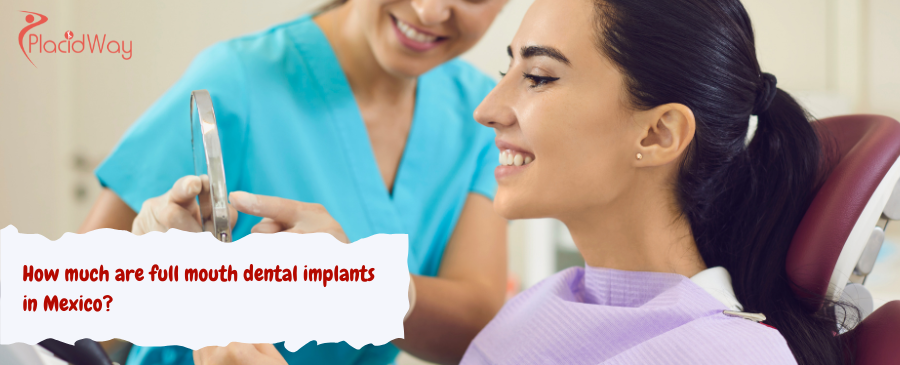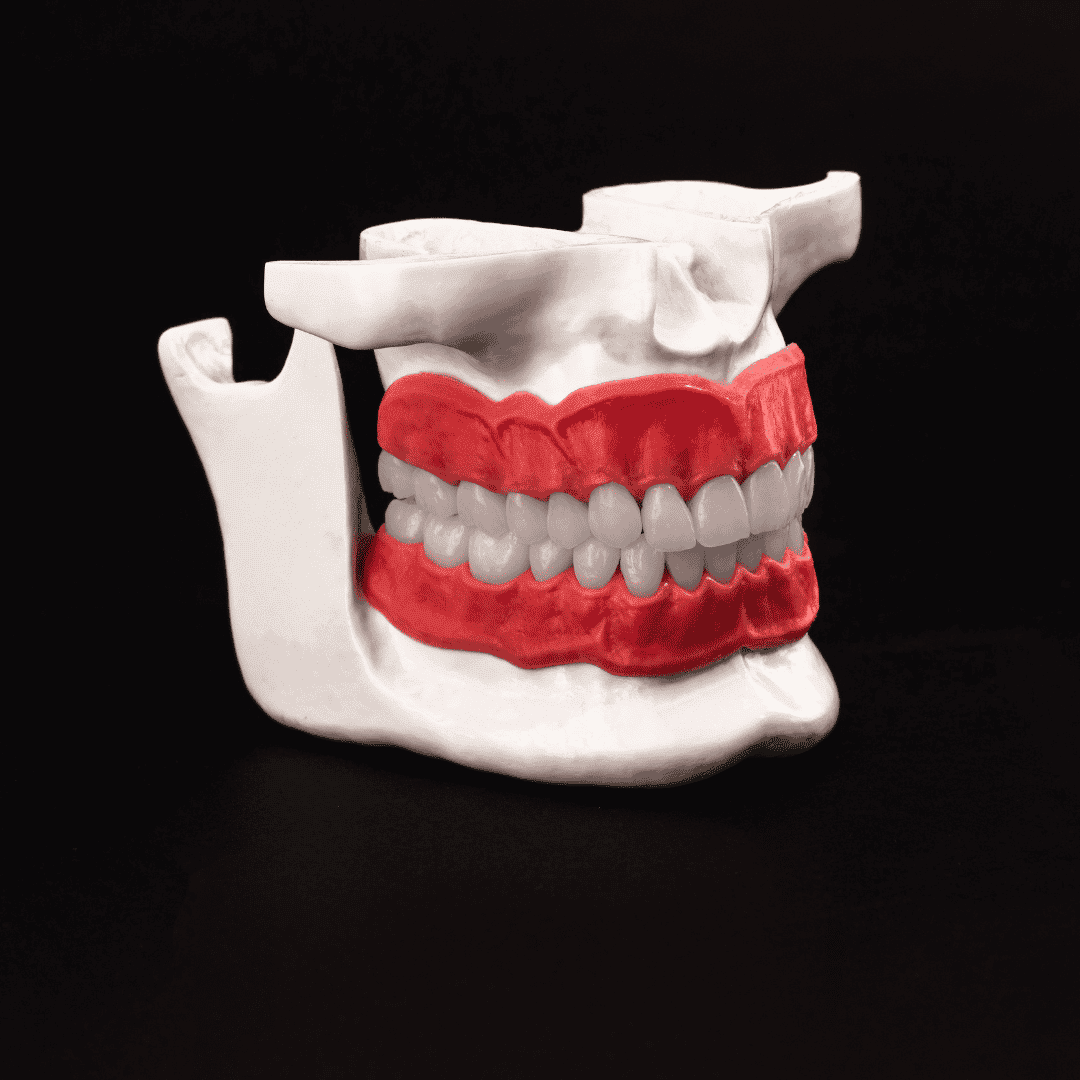Full Mouth Dental Implants Restoration Prices in Mexico
Full mouth dental implants can significantly improve your quality of life, offering a durable and natural-looking solution for missing teeth. For many, the high costs associated with these procedures in their home countries, particularly the USA and Canada, make international dental tourism an appealing option. Mexico has emerged as a leading destination for full mouth dental implants, offering a combination of affordability, quality care, and experienced dental professionals. This comprehensive guide aims to answer your most pressing questions about the cost, process, safety, and everything else you need to know about getting full mouth dental implants in Mexico.
What is the average cost of full mouth dental implants in Mexico?
"The average cost of full mouth dental implants in Mexico generally ranges from $7,000 to $15,000 per arch for procedures like All-on-4, and can go up to $10,000 to $25,000 per arch for All-on-6 or All-on-8, depending on the clinic, materials, and complexity."
Mexico offers a significant cost advantage for full mouth dental implants compared to countries like the USA and Canada. For instance, while an All-on-4 dental implant procedure might cost upwards of $24,000 to $50,000 per arch in the United States, the same procedure in Mexico can be found for a fraction of that price. This substantial difference in cost allows patients to access high-quality dental care without the financial burden often associated with such extensive treatments. The exact price can vary based on several factors, including the specific type of full mouth implant system chosen (e.g., All-on-4, All-on-6, All-on-8), the brand of implants used, the materials for the prosthetic teeth (e.g., acrylic, zirconia), and the reputation and location of the dental clinic.
This affordability is largely due to lower operating costs in Mexico, including overheads, labor, and materials. Many clinics in popular dental tourism destinations like Los Algodones, Cancun, and Tijuana also offer competitive pricing to attract international patients, creating a favorable market for those seeking affordable dental implants.
Why are full mouth dental implants so much cheaper in Mexico than in the USA or Canada?
"Full mouth dental implants are significantly cheaper in Mexico due to lower overhead costs, reduced labor expenses, competitive pricing in dental tourism hubs, and less stringent regulatory environments compared to the USA and Canada."
The cost disparity for full mouth dental implants between Mexico and its northern neighbors can be attributed to several economic and structural factors. First, the overall cost of living and operating a business in Mexico is considerably lower. This translates to lower rent for clinic spaces, reduced utility bills, and more affordable wages for dental staff and technicians. Second, dental education and licensing fees can be less expensive in Mexico, contributing to lower professional fees. Third, the competitive nature of the dental tourism market in Mexico drives clinics to offer more attractive pricing to a global clientele. Finally, while many Mexican clinics maintain high standards of quality and use similar, or even the same, high-quality materials and technologies as in the US or Canada, the regulatory environment may differ, potentially leading to lower compliance costs. These combined factors allow clinics in Mexico to offer full mouth dental implants at a price point that is often 50% to 70% less than what patients would pay in the USA or Canada, without necessarily compromising on the quality of care or materials.
What is included in the cost of full mouth dental implants in Mexico?
"The cost of full mouth dental implants in Mexico typically includes the dental implants themselves (e.g., 4, 6, or 8 per arch), the abutments, and the final prosthetic arch (e.g., hybrid fixed bridge of acrylic or zirconia). Many clinics also offer all-inclusive packages that may cover initial consultations, diagnostic imaging (X-rays, CT scans), temporary prosthetics, and follow-up appointments."
When considering full mouth dental implants in Mexico, it's crucial to understand what is encompassed in the quoted price. A standard package for a full arch, such as an All-on-4, usually includes the placement of four dental implants, the connectors (abutments) that attach the prosthetic to the implants, and the custom-made full arch prosthesis. This prosthesis can be made from different materials, with acrylic being a more economical option and zirconia offering superior aesthetics and durability, often at a higher cost.
Beyond the core components, many reputable Mexican clinics cater to international patients by offering comprehensive packages. These may include:
- Initial consultation and treatment planning: This involves a thorough examination, including 3D CT scans and panoramic X-rays, to assess bone density and overall oral health.
- Tooth extractions: If necessary, the removal of any remaining damaged teeth.
- Temporary prosthesis: A temporary set of teeth provided immediately after implant placement, allowing patients to have a functional and aesthetic smile during the healing period.
- Post-operative care and medications: Instructions and necessary prescriptions for pain management and infection prevention.
- Follow-up appointments: Though some follow-ups might be done locally upon returning home, some packages may include return visits to Mexico.
It's always advisable to clarify with the clinic exactly what is included in their quoted price to avoid any unexpected additional costs.
What are the different types of full mouth dental implants available in Mexico and their costs?
"The primary types of full mouth dental implants available in Mexico are All-on-4, All-on-6, and All-on-8, varying in the number of implants used per arch. All-on-4 typically costs from $7,000-$12,000 per arch, All-on-6 from $9,000-$14,000 per arch, and All-on-8 from $10,000-$16,000 per arch, with prices influenced by the prosthetic material."
The choice of full mouth dental implant system depends on the patient's individual needs, bone density, and budget. Each system offers a stable foundation for a full arch of prosthetic teeth, but they differ in the number of implants utilized:
- All-on-4 Dental Implants: This is a popular and cost-effective solution, using four strategically placed dental implants to support a full arch of teeth. It's often suitable for patients with some bone loss. In Mexico, All-on-4 can range from $7,000 to $12,000 per arch.
- All-on-6 Dental Implants: This system uses six implants per arch, providing greater stability and support, which can be beneficial for patients with good bone quality or those seeking maximum long-term durability. The cost for All-on-6 in Mexico generally falls between $9,000 and $14,000 per arch.
- All-on-8 Dental Implants: Utilizing eight implants, this option offers the highest level of support and distribution of biting forces, often recommended for patients with excellent bone density. These tend to be the most expensive, ranging from $10,000 to $16,000 per arch in Mexico.
The final cost will also be influenced by the material of the prosthetic arch. Acrylic prosthetics are generally less expensive, while zirconia offers superior strength, aesthetics, and longevity, and thus comes at a higher price. Some clinics may also offer "3 on 6" systems, which involve three individual bridges supported by six implants, providing a highly customized solution.
Are there additional costs or hidden fees to consider for full mouth dental implants in Mexico?
"While many clinics offer all-inclusive packages for full mouth dental implants in Mexico, potential additional costs can include bone grafting or sinus lifts if needed, higher-quality implant brands or prosthetic materials, temporary accommodations, travel expenses, and potential follow-up care in your home country."
Although Mexico offers significant savings on full mouth dental implants, it's wise to be aware of potential additional costs that might not be included in an initial quote:
- Bone Grafting/Sinus Lift: If a patient has significant bone loss in their jaw, a bone graft or sinus lift procedure may be required before implant placement to ensure sufficient bone volume. These procedures incur extra costs, typically ranging from $200-$1,000 per area for bone grafting and $700-$2,000 for a sinus lift.
- Premium Implant Brands: While many clinics use reputable implant brands, some offer a choice of premium brands (e.g., Nobel Biocare, Straumann) which can slightly increase the overall price.
- Prosthetic Material Upgrade: Opting for zirconia over standard acrylic for your final prosthetic bridge will typically increase the cost due to its superior strength and aesthetic qualities.
- Temporary Prosthetics: While often included, it's worth confirming if the cost of the temporary denture or bridge, used during the healing period, is part of the package.
- Travel and Accommodation: These are significant costs for dental tourists. While some clinics offer assistance or even packages that include hotel stays, patients should budget for flights, accommodation, local transportation, and meals.
- Medications: Post-operative medications, such as antibiotics and pain relievers, might not always be included.
- Follow-up Care: While the primary procedure is done in Mexico, long-term follow-up and maintenance check-ups might necessitate additional visits or can be handled by a local dentist, which may incur costs in your home country.
Always ask for a detailed, itemized quote from your chosen clinic to ensure full transparency and avoid surprises.
How long does the full mouth dental implant procedure take in Mexico?
"The complete process for full mouth dental implants in Mexico typically involves two phases over several months. The initial phase, including implant placement, usually requires a 3 to 7-day stay. A healing period of 3 to 6 months follows, after which a second, shorter trip of 3 to 5 days is needed for the placement of the final prosthetic teeth."
Getting full mouth dental implants is a multi-stage process that requires healing time. Here's a general breakdown of the timeline:
- Initial Visit (3-7 days): During this first trip to Mexico, the dental surgeon will perform any necessary tooth extractions, prepare the implant sites, and surgically place the dental implants into the jawbone. In many cases, a temporary set of teeth (often made of acrylic) will be immediately attached to the implants, allowing patients to leave with a functional and aesthetic smile. This initial phase can often be completed within a single week.
- Healing Period (3-6 months): This is the crucial "osseointegration" phase, where the dental implants fuse with the jawbone. This period is essential for the long-term stability and success of the implants and typically occurs while the patient is back in their home country.
- Second Visit (3-5 days): Once osseointegration is complete, the patient returns to Mexico for the second phase. During this visit, the temporary teeth are removed, impressions are taken (if not already done digitally), and the custom-fabricated permanent prosthetic arch (e.g., zirconia bridge) is fitted and securely attached to the implants.
While some clinics advertise "teeth in a day" or "one-trip" solutions, these are generally for specific cases where immediate loading is possible and may require an extended stay (7-15 days) to complete the final prosthesis. For most patients, a two-trip approach is standard to ensure proper healing and optimal results.
Is it safe to get full mouth dental implants in Mexico?
"Yes, it is generally safe to get full mouth dental implants in Mexico, provided you choose a reputable clinic with experienced, board-certified dentists, modern facilities, and adherence to international sterilization standards."
The safety of getting full mouth dental implants in Mexico is a common concern for many patients. The good news is that Mexico has a thriving dental tourism industry with many highly qualified and experienced dental professionals. Many Mexican dentists receive training internationally, including in the USA and Europe, and clinics in popular dental tourism destinations often invest in state-of-the-art technology and adhere to strict hygiene and sterilization protocols.
However, like any medical procedure, there are risks, and due diligence is paramount. To ensure safety and a successful outcome:
- Research Clinics Thoroughly: Look for clinics with strong reputations, positive patient reviews, and transparent pricing.
- Verify Dentist Credentials: Ensure your dentist has significant experience in implant dentistry, relevant certifications, and specialized training.
- Check for Accreditation: While not all clinics are internationally accredited, some may hold certifications from organizations that attest to their quality and safety standards.
- Communicate Clearly: Ensure there are no language barriers and that you fully understand the treatment plan, potential risks, and aftercare instructions.
- Understand Warranty Policies: Inquire about warranties on the implants and prosthetic work.
While there are certainly excellent dental clinics in Mexico, it's important to be cautious of extremely low prices that might indicate a compromise on quality, materials, or safety standards.
What is the success rate of full mouth dental implants in Mexico?
"The success rate of full mouth dental implants in Mexico is comparable to international standards, typically ranging from 95% to 98%, particularly when performed by experienced specialists using high-quality materials."
The success of full mouth dental implants largely depends on proper surgical technique, the quality of the implants and prosthetic materials, and the patient's adherence to post-operative care instructions. Reputable dental clinics in Mexico that specialize in implantology report success rates that align with those in developed countries. This high success rate is a testament to the expertise of the dental professionals and the use of advanced technology and materials.
Factors contributing to a high success rate include:
- Experienced Surgeons: Dentists with extensive training and years of experience in placing dental implants are crucial.
- Quality Implant Brands: Using globally recognized and scientifically proven implant brands ensures biocompatibility and long-term stability.
- Proper Diagnosis and Treatment Planning: Thorough assessments, including 3D imaging, allow for precise implant placement and optimal outcomes.
- Patient Compliance: Following post-operative instructions, maintaining excellent oral hygiene, and attending follow-up appointments are vital for success.
While a high success rate is generally expected, it's important to remember that no medical procedure is 100% guaranteed, and individual healing processes can vary.
What should I look for in a dental clinic in Mexico for full mouth dental implants?
"When choosing a dental clinic for full mouth dental implants in Mexico, prioritize clinics with: specialized implant dentists, a strong track record of positive reviews, modern technology (e.g., 3D imaging), transparent pricing, adherence to strict sterilization protocols, and clear communication about treatment plans and warranties."
Selecting the right dental clinic is arguably the most critical step in ensuring a successful and safe full mouth dental implant procedure in Mexico. Here's a checklist of what to look for:
- Specialized Implant Dentists: Confirm that the dentists performing the implant surgery are specialists in oral surgery, periodontics, or prosthodontics, with extensive experience specifically in dental implants.
- Patient Reviews and Testimonials: Look for genuine reviews on independent platforms, not just the clinic's website. Pay attention to feedback regarding patient care, results, and overall experience.
- Modern Facilities and Technology: A reputable clinic will utilize up-to-date equipment, including 3D CT scanners for accurate diagnosis and planning, digital impressions, and advanced sterilization equipment.
- Transparency in Pricing: A trustworthy clinic will provide a detailed, itemized quote with no hidden fees and clearly explain what is included.
- Sterilization Protocols: Inquire about their sterilization practices to ensure patient safety and prevent infections.
- Quality of Materials: Ask about the brands of dental implants they use (e.g., Nobel Biocare, Straumann, Zimmer Biomet) and the materials for the prosthetic teeth (e.g., zirconia, acrylic). Reputable brands indicate higher quality and longevity.
- Communication: Ensure the clinic staff and dentists can communicate effectively in your language (e.g., English) to prevent misunderstandings.
- Warranty Information: Understand the clinic's policy on warranties for the implants and the prosthetic work.
- Before and After Photos: Reviewing previous patient cases can give you an idea of the clinic's aesthetic and functional results.
- Location and Logistics Support: Consider clinics in easily accessible dental tourism hubs that may offer assistance with travel, accommodation, or local transportation.
What is the typical recovery process after full mouth dental implant surgery?
"The typical recovery process after full mouth dental implant surgery involves initial swelling and discomfort for a few days, followed by a soft diet for several weeks. Osseointegration, where the implants fuse with the bone, takes 3 to 6 months, during which time a temporary prosthetic is worn. Full recovery and adaptation to the final teeth can take several more weeks."
The recovery process after full mouth dental implant surgery is crucial for the long-term success of the treatment. Here's what you can generally expect:
Immediate Post-Surgery (First few days to a week):
- Swelling and Discomfort: Expect some swelling in the face and gums, along with mild to moderate pain. This can be managed with prescribed pain medication and cold compresses.
- Bleeding: Minor bleeding or oozing is normal for the first 24-48 hours.
- Soft Diet: You will be advised to stick to a soft, non-chewable diet to avoid putting pressure on the newly placed implants.
- Oral Hygiene: Gentle rinsing with a prescribed antiseptic mouthwash will be recommended, along with careful brushing around the surgical sites.
First Few Weeks:
- Swelling and bruising should subside significantly.
- You will continue to adhere to a soft diet, gradually reintroducing solid foods as tolerated.
- Maintaining meticulous oral hygiene is critical to prevent infection.
Osseointegration Phase (3-6 months):
- This is the most important healing period where the implants integrate with your jawbone. You will wear your temporary prosthetic during this time.
- It is vital to avoid chewing hard or sticky foods on the temporary teeth and to follow any specific instructions from your dentist.
- No significant pain should be experienced during this phase, but occasional mild soreness is possible.
After Final Prosthetic Placement:
- Once the permanent prosthetic teeth are placed, there might be a short adjustment period as you get used to your new bite and feel.
- Most patients adapt quickly and can enjoy a full range of foods.
- Long-term care involves regular brushing, flossing (with special implant-specific tools), and routine dental check-ups to ensure the health of your implants and gums.
Following your dentist's post-operative instructions diligently is key to a smooth recovery and successful outcome.
Can I get immediate loading full mouth dental implants in Mexico?
"Yes, immediate loading full mouth dental implants are available in Mexico, allowing patients to receive a temporary set of fixed teeth on the same day as implant placement. However, eligibility depends on sufficient bone density and good oral health, and it may still require a second trip for the permanent prosthesis."
Immediate loading (often referred to as "Teeth in a Day" or "Same-Day Teeth") is a technique where a temporary fixed prosthetic is attached to the newly placed dental implants on the same day of surgery. This means you can leave the clinic with a functional and aesthetic smile, avoiding the need for removable dentures during the healing period.
Not every patient is a candidate for immediate loading. Ideal candidates typically have:
- Sufficient Bone Density: Adequate bone volume and quality are essential for the implants to achieve primary stability immediately after placement.
- Good General and Oral Health: Patients should be free from conditions that could compromise healing, such as uncontrolled diabetes or severe gum disease.
- Non-Smoking: Smoking can significantly impair healing and reduce implant success rates.
Even with immediate loading, the temporary prosthesis is usually made of a lighter material like acrylic, designed to avoid excessive pressure on the healing implants. After the osseointegration period (3-6 months), a second trip to Mexico is typically required to replace the temporary teeth with the durable, permanent prosthetic (e.g., zirconia bridge). While immediate loading offers convenience, it's crucial to consult with a qualified implant dentist to determine if it's the right option for your specific case.
What are the materials used for full mouth dental implant prosthetics in Mexico?
"The most common materials used for full mouth dental implant prosthetics in Mexico are acrylic (often reinforced with a titanium bar) and zirconia. Acrylic is more economical and often used for temporary prosthetics, while zirconia offers superior durability, aesthetics, and stain resistance for permanent restorations."
The material chosen for your full mouth dental implant prosthetic significantly impacts its appearance, durability, and cost. Clinics in Mexico typically offer two main options:
Acrylic (Hybrid Denture):
- Description: This type of prosthetic features acrylic teeth and gums bonded to a metal framework (often titanium) that attaches to the implants.
- Pros: Generally more affordable, lighter weight, and easier to repair if chipped or fractured. It's frequently used for temporary prosthetics due to its ease of fabrication.
- Cons: Less durable than zirconia, can be more prone to staining, and may wear down over time, requiring replacement after several years.
Zirconia (Full Zirconia Bridge):
- Description: A solid, monolithic bridge made entirely of highly durable zirconia, a ceramic material known for its strength and aesthetic qualities.
- Pros: Extremely durable and resistant to chipping, cracking, and staining. Offers superior aesthetics due to its translucent properties, mimicking natural teeth. Long-lasting, often considered a lifetime solution with proper care.
- Cons: More expensive than acrylic, and if damaged, repairs can be more complex, sometimes requiring full replacement.
The choice between acrylic and zirconia depends on your budget, aesthetic preferences, and the dentist's recommendation based on your bite forces and lifestyle. Many patients opt for zirconia for its long-term benefits and natural appearance.
What is the difference between All-on-4, All-on-6, and All-on-8 dental implants?
"The primary difference between All-on-4, All-on-6, and All-on-8 dental implants for a full arch lies in the number of implants used to support the prosthetic teeth. All-on-4 uses four implants, All-on-6 uses six, and All-on-8 uses eight, with a higher number generally providing increased stability and bone preservation, but also increasing cost."
Understanding the variations in full mouth dental implant systems is crucial for making an informed decision:
- All-on-4: This innovative technique utilizes four precisely placed dental implants (two straight in the front and two tilted in the back) to support a full arch of prosthetic teeth. It's a popular choice for patients with some bone loss in the posterior jaw, as the tilted implants can bypass areas with less bone. It offers a cost-effective and efficient solution for full arch replacement.
- All-on-6: As the name suggests, this system uses six dental implants per arch. The additional two implants provide extra stability and a broader distribution of chewing forces, which can be advantageous for patients with good bone density or those who exert significant bite pressure. The increased number of implants can also help in preserving more jawbone over time.
- All-on-8: This system employs eight dental implants per arch, offering the maximum number of implants for full arch support. It provides the highest level of stability, strength, and even distribution of forces, making it ideal for patients with excellent bone quality who seek the most robust and long-lasting solution. However, it is also the most invasive and expensive option.
The choice among these systems depends on factors such as bone quality and quantity, overall health, specific dental needs, and budget. Your implant dentist will assess your individual situation to recommend the most suitable option.
What are the benefits of choosing Mexico for full mouth dental implants?
"Choosing Mexico for full mouth dental implants offers significant benefits, including substantially lower costs (often 50-70% less than in the US/Canada), access to highly qualified and internationally trained dentists, state-of-the-art clinics, and the opportunity to combine treatment with a vacation experience."
The growing popularity of Mexico as a destination for full mouth dental implants is driven by several compelling advantages:
- Cost Savings: This is the most significant draw. The vast difference in pricing allows patients to receive comprehensive, high-quality dental care that might be unaffordable in their home countries.
- Quality of Care: Many Mexican dental clinics, particularly those catering to international patients, adhere to high standards of care. They employ skilled dentists who often have international education and training, utilize modern technology (e.g., CAD/CAM, 3D imaging), and use globally recognized implant brands.
- Accessibility: For patients in the United States and Canada, Mexico is geographically convenient. Border towns like Los Algodones and Tijuana are easily accessible by car, while major cities like Cancun and Puerto Vallarta offer direct flights, making travel relatively straightforward.
- Reduced Waiting Times: Unlike some countries where there might be long waiting lists for specialist dental procedures, clinics in Mexico often offer quicker appointment availability.
- Tourism Opportunity: Many patients combine their dental treatment with a vacation, enjoying Mexico's rich culture, beautiful beaches, and vibrant cities while recovering.
- English-Speaking Staff: Most reputable clinics catering to international patients have English-speaking staff, ensuring clear communication throughout the treatment process.
These benefits make Mexico an attractive option for those seeking effective and affordable solutions for full mouth dental implants.
How do I find a reputable clinic for full mouth dental implants in Mexico?
"To find a reputable clinic for full mouth dental implants in Mexico, start by researching online reviews and testimonials, verifying dentists' credentials and experience, looking for clinics with modern technology and transparent pricing, and consider using medical tourism facilitators for vetted options and logistical support."
Finding a trustworthy clinic for full mouth dental implants in Mexico requires careful research and due diligence. Here's a step-by-step approach:
Online Research:
- Google Reviews and Maps: Look for clinics with a high volume of positive reviews and a strong overall rating. Read through individual testimonials to gauge patient experiences.
- Dental Tourism Platforms: Websites specializing in dental tourism (like PlacidWay) often list accredited clinics, provide patient reviews, and offer comparison tools.
- Forums and Social Media Groups: Online communities can provide insights and personal recommendations from individuals who have undergone similar procedures in Mexico.
Verify Dentist Credentials:
- Check the dentist's education, specialization (e.g., oral surgeon, prosthodontist), and years of experience specifically with dental implants. Many top Mexican dentists are members of international dental associations.
Clinic Accreditation and Standards:
- Inquire if the clinic holds any international accreditations or follows specific quality management systems (e.g., ISO certifications). While not mandatory, these can be indicators of quality.
- Ask about their sterilization protocols and the brands of implants and materials they use.
Technology and Facilities:
- Ensure the clinic uses modern dental technology, such as 3D CT scans, digital X-rays, and in-house labs (if applicable), which can improve precision and efficiency.
Transparent Pricing:
- Request a detailed, itemized quote that clearly outlines all costs, including the procedure, materials, temporary prosthetics, and any potential additional fees.
Communication:
- Confirm that the clinic has English-speaking staff to facilitate clear communication before, during, and after your treatment.
Consultation:
- Many clinics offer online consultations. Take advantage of these to ask specific questions about your case, the treatment plan, and logistics.
Medical Tourism Facilitators:
- Consider working with a reputable medical tourism facilitator. These companies often have established networks of vetted clinics, can assist with travel arrangements, and provide support throughout your journey, helping to reduce the stress of planning international medical care.
By following these steps, you can significantly increase your chances of finding a safe and reputable clinic for your full mouth dental implants in Mexico.
What is the long-term prognosis for full mouth dental implants in Mexico?
"The long-term prognosis for full mouth dental implants obtained in reputable Mexican clinics is excellent, often lasting 15-25 years or even a lifetime with proper oral hygiene and regular dental check-ups, mirroring the longevity observed in developed countries."
The longevity and success of full mouth dental implants are a major reason for their popularity. When performed by skilled professionals using quality materials, these implants are designed to be a permanent solution for tooth loss. The implants themselves, typically made of titanium, can last a lifetime as they integrate directly with the jawbone.
The lifespan of the prosthetic teeth (the bridge or denture attached to the implants) can vary depending on the material chosen and the patient's habits:
- Acrylic Prosthetics: While durable, these may need to be replaced or relined every 5-10 years due to wear and tear.
- Zirconia Prosthetics: These are exceptionally durable and can last for 15-25 years or even longer, often considered a lifetime restoration.
Key factors influencing the long-term prognosis include:
- Oral Hygiene: Meticulous daily brushing and flossing are essential to prevent peri-implantitis (gum disease around implants).
- Regular Dental Check-ups: Routine visits to a dentist, either in Mexico or your home country, for professional cleanings and examinations are crucial for monitoring implant health.
- Lifestyle Factors: Avoiding excessive force (e.g., chewing ice, grinding teeth without a nightguard) and not smoking can significantly extend the life of your implants.
- Initial Bone Quality: Good bone density at the time of implant placement contributes to long-term stability.
Patients who commit to excellent oral hygiene and follow their dentist's recommendations can expect their full mouth dental implants from Mexico to provide a functional and aesthetic smile for many years.
Can I get a warranty on my full mouth dental implants from a Mexican clinic?
"Many reputable Mexican clinics offer warranties on full mouth dental implants, typically covering the implants themselves for several years or even a lifetime, and the prosthetic restorations for a shorter period, usually 1-5 years. It is crucial to confirm the specific terms and conditions of any warranty before starting treatment."
Warranties on full mouth dental implants are a significant factor for patients seeking treatment abroad, providing peace of mind. Many high-quality dental clinics in Mexico do offer warranties, often on par with those found in the USA or Canada.
Here's what to expect regarding warranties:
- Implant Warranty: The actual titanium implant posts are often covered by a lifetime warranty from the implant manufacturer. Some clinics extend this to cover the placement if the implant fails to integrate.
- Prosthetic Restoration Warranty: The fixed bridge or denture (acrylic or zirconia) usually comes with a separate warranty, typically ranging from 1 to 5 years. This covers defects in materials or craftsmanship.
Important Considerations for Warranties:
- Terms and Conditions: Carefully read and understand the warranty document. It will specify what is covered, for how long, and what conditions apply (e.g., maintaining regular check-ups, avoiding certain habits).
- Patient Responsibility: Warranties often require the patient to maintain good oral hygiene and attend recommended follow-up appointments. Failure to do so may void the warranty.
- Travel for Warranty Claims: If a warranty issue arises, you may need to travel back to the clinic in Mexico for the repair or replacement, which incurs additional travel expenses.
- Clinic Reputation: Clinics with a long-standing reputation are more likely to honor their warranties.
Always discuss warranty details thoroughly with the clinic before committing to treatment.
What is the process for planning my trip for full mouth dental implants to Mexico?
"Planning a trip for full mouth dental implants to Mexico involves several key steps: initial online consultation and sending medical records, receiving a personalized treatment plan and quote, booking flights and accommodations, and arranging ground transportation and local logistics with the clinic's assistance."
Planning a dental tourism trip for full mouth dental implants requires careful organization to ensure a smooth and successful experience. Here's a general roadmap:
Initial Research and Clinic Selection:
- As discussed, thoroughly research and choose a reputable clinic based on reviews, credentials, technology, and pricing transparency.
Online Consultation and Medical Records:
- Contact your chosen clinics for an online consultation. You'll typically need to send recent dental X-rays (panoramic or 3D CT scan if available), photos of your teeth, and a brief medical history.
- Based on this, the dentist will provide a preliminary diagnosis, a recommended treatment plan (e.g., All-on-4, All-on-6), and an estimated cost.
Review Treatment Plan and Quote:
- Carefully review the proposed treatment plan, asking any questions you have about the procedures, materials, timeline, and what's included in the cost.
- Confirm the number of trips required and the duration of each stay.
Travel and Accommodation Booking:
- Once you're comfortable with the clinic and plan, book your flights to the nearest airport to your chosen dental destination (e.g., Tijuana for Los Algodones, Cancun International for Cancun).
- Arrange accommodation, considering hotels near the clinic that offer comfort and convenience for post-operative recovery. Many clinics have partnerships with local hotels or can offer recommendations.
Logistics and Local Transportation:
- Coordinate with the clinic regarding airport pick-up or local transportation to and from appointments. Many clinics offer complimentary shuttle services, especially in border towns.
- Understand the local currency and plan for any necessary cash or payment methods.
Pre-Trip Preparations:
- Inform your bank about your international travel plans.
- Ensure your passport is valid.
- Pack comfortable clothing, any necessary personal medications, and a light-hearted attitude for your recovery period.
- Consider travel insurance that includes medical coverage.
During Your Visit:
Arrive a day or two before your first appointment to settle in.
- Attend all scheduled appointments and follow post-operative instructions diligently.
- Enjoy your time in Mexico responsibly while prioritizing your recovery.
By meticulously planning each step, you can make your journey for full mouth dental implants in Mexico a positive and successful experience.
Ready to transform your smile with high-quality, affordable full mouth dental implants? Explore how PlacidWay can connect you with top-rated clinics in Mexico and other leading medical tourism destinations, offering transparent pricing and comprehensive support for your healthcare journey.




.jpg)




.png)





